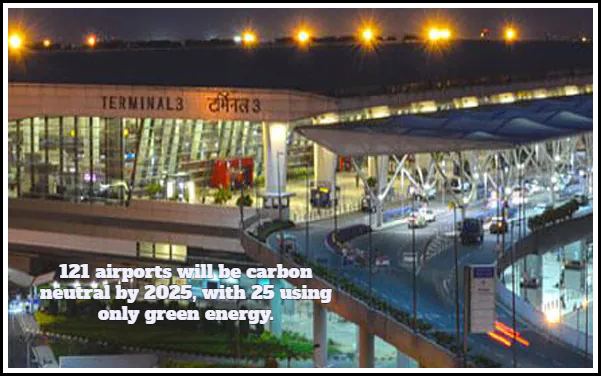Business
121 airports will be carbon neutral by 2025
Published
1 year agoon

121 airports will be carbon neutral by 2025, with 25 using only green energy.
“By 2024, we want airports to use only green energy, and by 2030, we want them to be net zero.” Already, 25 AAI airports are powered entirely by green energy. By 2025, we hope to have another 121 airports achieve carbon neutrality, according to Mr. Scindia.
In New Delhi: According to Union Aviation Minister Jyotiraditya Scindia, there are 25 airports in the nation that run entirely on green energy, and another 121 will be carbon neutral by 2025.
These remarks were made by Mr. Scindia during his virtual speech at the two-day EU-India aviation summit. He tested positive for Covid, so he was unable to physically attend the event.
The aviation sector’s contribution to emissions has come under intense scrutiny. He claimed that India and the European Union share a commitment to combating climate change. “We have taken several measures to reduce the carbon footprint and mitigate emissions from the aviation industry,” he said.
Read Also:- In Jammu and Kashmir, a terrorist attack on an army truck resulted in the martyrdom of five troops.
“By 2024, we want airports to use only green energy, and by 2030, we want them to be net zero.” Already, 25 AAI airports are powered entirely by green energy. By 2025, we hope to have another 121 airports achieve carbon neutrality, he continued.
A total of 148 airports are currently in use in India, including 137 airports, 2 water aerodromes, and 9 heliports.
Airports that are carbon neutral leave no carbon footprints and meet all of their energy needs with renewable sources of energy like solar and hydropower. Additionally, the airports offset any lingering CO2 emissions that are directly under their control.
Airports that are carbon neutral have adopted more extensive green practises, bought carbon credits, and have resources like wastewater recycling, solar energy, LED lighting, and more that can reduce carbon emissions.
The minister said that the use of renewable energy is now required by the government as part of the bid documents for future airports.
Additionally, we are attempting to promote the use of sustainable aviation fuel. Indian airline operators have already used biofuel that has been blended with ATF in demonstration flights, according to him.
Additionally, Mr. Scindia invited EU participants to collaborate with India in the development of adaptive technologies and to support the goal of reducing emissions from the aviation sector.
The summit, which started on Thursday, will centre on the relationship between the EU and India in terms of air travel as well as the opportunities and challenges that the two countries share, such as the post-Covid recovery of air traffic, boosting sustainability, maintaining safety, and developing unmanned aircraft systems.
High-ranking policymakers, business leaders, and stakeholders from the EU and India will attend the summit.
The aviation minister mentioned that India has changed its regulatory framework to support domestic aircraft production.
In order to make the regulatory environment more favourable for MROs, we reduced the GST rate on MRO services from 18% to 5% and allowed 100% Foreign Direct Investment into the industry. In order to make doing business easier, new MRO guidelines have also been implemented to rationalise the fees assessed to MRO service providers.
He continued, “I would encourage industry players from the EU to take advantage of these opportunities and join the world’s aviation market that is expanding the quickest.
You may like
-


North Korea asserts that the test of a multiple-warhead missile was successful
-


The Student Wing of Congress storms the Exam Body NTA office and locks it from within
-


“During President Murmu’s address to Parliament, PM Modi was shown 73 times, and LoP Rahul Gandhi was shown six times”: Congress
-


NASA contracts Elon Musk’s SpaceX to deorbit the International Space Station in 2023.
-


A Caution For The CBI In The Delhi Court’s Arvind Kejriwal Custody Order
-


Bar Council of India requests that bar associations abstain from demonstrating in opposition to new criminal laws
